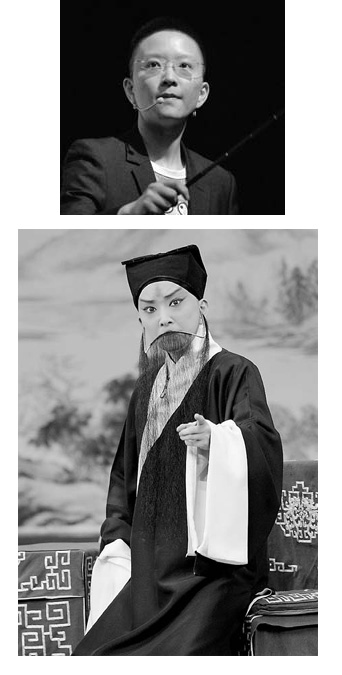China
Opera star has lots of sex appeal
By Cheng Yingqi (China Daily)
Updated: 2010-09-09 08:01
 |
Large Medium Small |
|
Top: Wang Peiyu, a Peking Opera star who portrays men on stage, delivers a lecture in May at East China University of Science and Technology in Shanghai. Above: Wang Peiyu performs in Sougujiugu, a traditional Peking Opera, at the Mei Lanfang Grand Theater in Beijing in December 2009. |
Female performer gains fame for playing men's roles
BEIJING - There's a saying that a woman can never truly understand a man and vice versa. But Wang Peiyu is an exception.
The Peking Opera performer, who just turned 32, is known for her insightful portrayals of men in Chinese history and traditional dramas.
Her specialty is the lao sheng, or adult male.
"Some friends asked me if I became more manlike after playing those old male roles. I said 'somewhat'," said Wang, who has acquired fame for her exceptional vocal skills, gestures, facial expressions and insightful portrayal of characters since her debut at age 14.
Sporting an inch-long haircut, Wang reminds one of Li Yuchun, a popular Super Girl star whose gender neutral appearance has won over the country's young generation.
Yet, despite often being billed as the Super Girl of the Peking Opera world, Wang's focus is worlds away from the pop icons of the American Idol style talent show.
"I faithfully believe that Peking Opera has a huge market," Wang said. "The problem now is how to revive people's love of it."
Born and raised in Suzhou, Jiangsu province, Wang entered the Shanghai Academy of Drama at age 13, somewhat too old to start Peking Opera.
But her background included literature, calligraphy and traditional Chinese musical instruments, as well as pingtan, a traditional form of storytelling and ballad singing.
By 16, she had won every prize for a Peking Opera performer in Jiangsu province.
She became the first girl to take on male roles since the 1950s and was a follower of the Yu School, whose forefather, Yu Shuyan, is considered one of the most prominent sheng actors in Peking Opera history.
Many have compared her to the late female sheng player Meng Xiaodong, who was as well received as the late Peking Opera master Mei Lanfang in the early 20th century.
Despite her professional success, Wang, a leading performer with the Shanghai Peking Opera Troupe, has been worried about the development of Peking Opera.
The centuries-old opera, once considered the highest artistic expression of Chinese culture, has been losing ground to pop culture for nearly 20 years.
Wang thought that she might be able to draw the public back to the theater with some her own artistic creations.
In 2004, she resigned from the troupe to start her own studio, which failed in less than a year.
"Most people simply did not understand what we were singing in the Peking Opera," Wang said. "It is reasonably understandable because, over almost two decades, the opera had lost its connection with people's daily lives."
Wang admitted that she didn't like the way people relate her to Super Girl. But she has now come to see that the celebrity effect might be able to revive the young generation's worship of Peking Opera.
"Most Peking Opera fans have their favorite performer and would pay to watch their shows," Wang said. "Unless you create stars, you won't be able to bring fans to the theater."
In order to make use of her popularity, Wang hired an agent to make her a real "star".
She gives lectures for young people in big cities like Beijing, Shanghai and Suzhou, where she enjoys a great following.
She also updates her life and work on a blog to share with her fans.
"Young people do not care so much about the history and the professional language of Peking Opera. So I don't use jargon," Wang said.
"Instead, I stand in front of them to show that a lao sheng performer is also a fashion-conscious young person. Peking Opera is not as old and boring as they may have imagined."
Wang plans to create a variety of shows for different markets.
For amateur performers, traditional opera works best, she said, while people who experienced the "cultural revolution" (1966-76) prefer stories about revolutionary heroes.
"For young people, we can use a dramatic story with magnificent stage effects to attract them," she added.
"It doesn't matter who you are, it matters what you do. I'm trying and I hope other performers will make the attempt for the benefit of Peking Opera."
China Daily
(China Daily 09/09/2010 page2)
